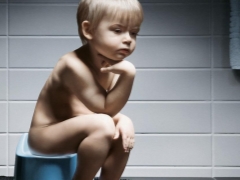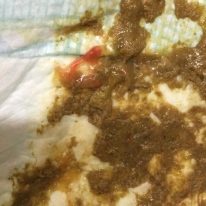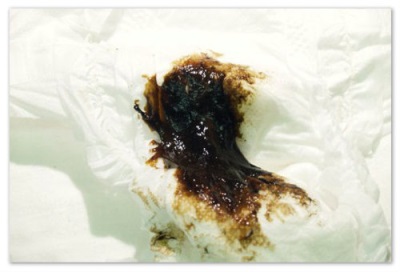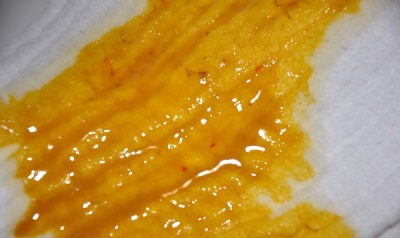Defecation with blood in a child
Such a symptom as the appearance of blood in the feces can scare any mother. The causes of its occurrence are different, including diseases dangerous to the health of babies. In order to know how to act when detecting shit with blood, parents need to know under what pathologies this happens and in which cases it is urgent to show the baby to the doctor.
What does a blood stool look like?
Bloody stools in a child may look different. Clean blood or blood clots may appear from the baby’s rectum. Feces may be covered with blood or evenly mixed with it.
Color of blood in feces
Bright red
If the blood is in the feces of alai, this often confirms that its source is in the lower part of the intestine. With such secretions, the mother usually sees the blood and the shit separately (they do not mix with each other).
The most common causes of bright red blood in the child's stool are anal fissures and hemorrhoids. When a crack occurs, the child will complain of pain in the anus during a bowel movement, and toilet paper will show blood. Such a problem in children is usually caused by too hard feces or difficulties with its discharge (constipation).
With hemorrhoids, blood may drip from the anus and get into the feces, and the child complains of itching, pain, and foreign sensation in the anus. Most often hemorrhoids in childhood are provoked by constipation, a long stay on the pot, a long weeping, low activity, or congenital features of the structure of hemorrhoidal veins.
You can learn about the causes of hemorrhoids in infants from the transfer of Dr. Komarovsky.
Also causes of red blood in the fecal masses of children are:
- Polyps in the rectum.
- Ulcerative colitis.
- Meckel's diverticulum.
- Proctitis.
- Tumors in the large intestine.
- Crohn's disease.
Watch a useful video prepared by the Union of Pediatricians of Russia, which gives practical advice to parents and tells you what to do when blood is found in the baby’s feces:
Dark
If the contents of the diaper or pot become dark and the blood is evenly mixed with the feces, this is a more unfavorable symptom, as it may indicate bleeding in the upper digestive system, for example, in the stomach.
The blood that is released during such bleeding during exposure to the gastrointestinal tract is exposed to enzymes and microbial flora, causing the feces to darken (turn black).
If the baby has recently undergone surgery, a dark stool with blood is a warning sign that appears when internal bleeding occurs. At the same time, the crumbs will have other signs of bleeding, for example, pallor, weakness, dizziness.
Causes in infants
Blood in the liquid stool
Infection, a symptom of which is diarrhea with blood, can also be caused by viruses (for example, rotavirus).
The discharge of feces with blood and mucus is characteristic of dysentery. With such an infection, in addition to stool disorders, a child has a fever, headaches, weakness, cramping abdominal pain, and an increased urge to defecate.
In addition, the dilution of feces and blood impurities in it occur when:
- Food poisoning.
- Parasitic infection.
- Intestinal lesions with drugs.
- Allergic reactions.
- Inflammatory bowel disease.
- Surgical diseases, for example, intestinal obstruction.
What to do
Having noticed streaks of blood in the contents of the pot or a reddish tint of the feces, it is best to contact a pediatrician. Remember that the acquisition of red blood by the feces of the child is found not only for bleeding, but may also be for non-dangerous causes, for example, after eating beets or sweets with a red dye. It is difficult for the mother to visually distinguish whether the feces of the baby are colored due to food or it is a symptom of bleeding, so the best way to detect red stool is to consult a doctor.
If the blood in the stool is associated with an inflammatory disease of the digestive tract, the mother will notice a deterioration in the child’s well-being and a decrease in body weight. In case of serious diseases, the blood in the feces will be accompanied by fever, severe abdominal pain, bouts of vomiting and other adverse symptoms. With such symptoms, it is especially important to call a pediatrician to a child younger than a year, because dehydration in infants occurs rather quickly and is very dangerous.
To the doctor quickly and accurately diagnosed, parents should tell him in detail about the changes in the chair and the health of the daughter or son. The doctor will need information about how exactly the fecal mass looked, whether the child had constipation before bowel movement, whether there were any other impurities in the stool, and what other complaints appeared. Before the arrival of the doctor should not give the baby any medications, as well as feed the child.
Medical tactics for defecating a child with blood will be determined by the cause of such a symptom. For example, if the cause is an anal fissure, therapy will help it to heal quickly, and with an intestinal infection, treatment will be aimed at eliminating dehydration and fighting the pathogen. In some cases, for example, with bleeding provoked by Meckel’s diverticulum, surgical treatment is indicated.













